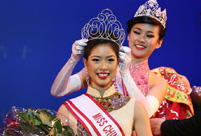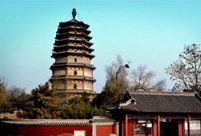

WASHINGTON, Feb. 25 -- Chinese Foreign Minister Wang Yi delivered a speech at a U.S. think tank here Thursday, laying out priorities of Chinese diplomacy that are in line with the country's development objectives.
"We are uniting all the people in China in the common effort to realize the Chinese dream of national rejuvenation," Wang said at the Center for Strategic and International Studies. "Chinese diplomacy will serve this overriding domestic objective."
Diplomacy is an extension of internal affairs, Wang said, adding that Chinese diplomacy is aimed at creating a more stable and friendly external environment for China's development.
Over the past years, he said, China has been more proactive in defending its legitimate and lawful national interests, shouldering international obligations, and working with other countries, particularly the United States.
Wang reiterated that China is firmly safeguarding the international order and system established since the end of the Second World War.
Speaking about the Asian Infrastructure Investment Bank (AIIB), Wang said China is willing to make it an open, international and professional body that complements the existing international financial system.
He also highlighted the "Belt and Road Initiative" that China proposed, pledging to increasing connectivity, production-capacity cooperation and people-to-people exchange to the benefit of all.
On the nuclear issue of the Democratic People's Republic of Korea (DPRK), Wang emphasized China's firm goal that the Korean Peninsula must be de-nuclearized and there can be no war or turbulence.
"How can de-nuclearization be achieved?" Wang said. "Ultimately we have to go through negotiation, just as the case of the Iranian nuclear issue where 10 years of negotiation has produced a comprehensive agreement there."
Wang also voiced China's concerns over the possible deployment of the Terminal High Altitude Area Defense (THAAD), an advanced U.S. missile defense system, in the Republic of Korea (ROK), saying that it could threaten China's security interests.
The X-band radar associated with the THAAD system has a radius that goes far beyond the Korean Peninsular and reaches into the interior of China, he said.
"We believe China's legitimate security concerns must be taken into account" as the United States and ROK discuss the deployment of the defense system, he said. "A convincing explanation must be provided to China. I don't think it's too much to ask."
The United States and the ROK started talks on THAAD after the DPRK conducted its fourth nuclear test on Jan. 6 and allegedly launched an Earth-observation satellite to test ballistic missile technology on Feb. 7.
On the issue of South China Sea, the Chinese foreign minister said the general situation there is stable and China adheres to solving the disputes through dialogue.
"No commercial vessel has complained that its freedom of navigation has been threatened or jeopardized," Wang added.
He said that Beijing and Washington have "far more common interests than areas of disagreement," adding that the two sides should boost strategic mutual trust, deepen practical cooperation and constructively manage differences to achieve greater progress in bilateral ties.
Developing a strong China-U.S. relationship is in the interests of both sides and is in accordance with the aspirations of the international community, he said.
The Chinese foreign minister, who arrived here Tuesday for a three-day official visit, also held meetings with U.S. President Barack Obama and U.S. National Security Advisor Susan Rice on Wednesday.
 Engineer troop builds bridge in real combat conditions
Engineer troop builds bridge in real combat conditions You can urinate in public in Chongqing
You can urinate in public in Chongqing Rice terrace scenery in southwest China's Yunnan
Rice terrace scenery in southwest China's Yunnan 2016 Miss Chinatown USA pageant held in San Francisco
2016 Miss Chinatown USA pageant held in San Francisco Ancient pagodas across China
Ancient pagodas across China Wedding dress show up in the air
Wedding dress show up in the air Candidates perform in 2nd examination at Beijing Film Academy
Candidates perform in 2nd examination at Beijing Film Academy Russian photographer brings fairytales to life
Russian photographer brings fairytales to life Chinese beauties, foreign models meet in Chengdu
Chinese beauties, foreign models meet in Chengdu Top 20 hottest women in the world in 2014
Top 20 hottest women in the world in 2014 Top 10 hardest languages to learn
Top 10 hardest languages to learn 10 Chinese female stars with most beautiful faces
10 Chinese female stars with most beautiful faces China’s Top 10 Unique Bridges, Highways and Roads
China’s Top 10 Unique Bridges, Highways and Roads Chain security dilemma shadows Northeast Asia
Chain security dilemma shadows Northeast Asia Roads widen as compound gates come down
Roads widen as compound gates come down Chinese students in US get first taste of demonstrations
Chinese students in US get first taste of demonstrations Master users school foreigners on how to use pics and gifs
Master users school foreigners on how to use pics and gifs Day|Week